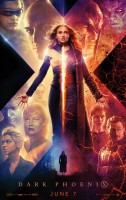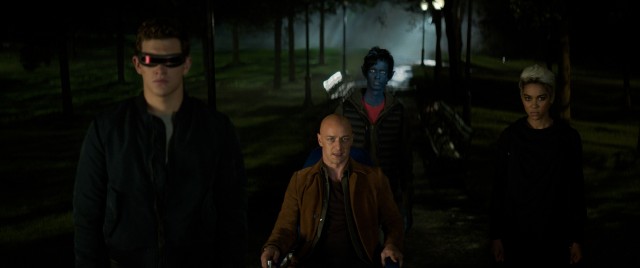Dark Phoenix Movie Review
 |
Dark Phoenix
Theatrical Release: June 7, 2019 / Running Time: 114 Minutes / Rating: PG-13 Director: Simon Kinberg / Writers: Simon Kinberg (screenplay); Stan Lee, Jack Kirby (characters) Cast: James McAvoy (Charles Xavier/Professor X), Michael Fassbender (Erik Lensherr/Magneto), Jennifer Lawrence (Raven/Mystique), Nicholas Hoult (Hank/Beast), Sophie Turner (Jean Grey), Tye Sheridan (Scott "Cyclops" Summers), Alexandra Shipp (Storm), Jessica Chastain (Smith), Evan Peters (Quicksilver), Scott Shepherd (), Kodi Smit-McPhee (Kurt/Nightcrawler), Ato Essandoh (Jones), Brian D'Arcy James (President of the United States), Halston Sage (Dazzler), Kota Eberhardt (Selene/Black Queen) |
The X-Men really had something special in Matthew Vaughn's First Class (2011) and Bryan Singer's Days of Future Past (2014). What might have simply been a way to extend the shelf life of a franchise with prequels starring young, affordable actors on the rise wound up, by most accounts, exceeding the original series that began with Singer at the helm in 2000. Then, Singer's 2016 X-Men: Apocalypse, Dark Phoenix forgoes the X-Men name in the title and, less curiously, sheds all ties to Singer, who has his own troubles despite (mostly) helming one of last year's top-grossing Oscar winners. With Fox having been acquired by Disney, a transaction that seemingly paves the way for the fanboy dream that is the X-Men crossing over into the MCU, this film seems like a victim of poor timing. It certainly isn't the ideal vessel for one's directorial debut, which Simon Kinberg, an X-Men writer since 2006's The Last Stand and producer since First Class, makes here.
Dark Phoenix seems just as uncertain about its standing as you are. The filmmakers cannot be oblivious to the audience erosion that started with Apocalypse and seems certain to continue. But they haven't made any adjustments to account for that. There's no attempt to turn this into an epic finale or a set-up for next year's equally iffy, perpetually-postponed spin-off The New Mutants. Kinberg doesn't try to do what Taika Waititi did in Thor: Ragnarok and make a fun standalone adventure that doesn't exactly follow what's already went down. Instead, Kinberg, who's also the lone credited screenwriter, decides merely to give moviegoers more of the same. That is almost never the antidote to the laws of diminished returns and none too surprisingly, Dark Phoenix is every bit as underwhelming and forgettable as Apocalypse was.
An opening scene set in 1975 introduces us to Jean Grey as a child. Discovering her powers in the backseat of her parents' car by messing with the radio while they drive results in a tragic accident. It is this act that brings her to the school for gifted youngsters run by Professor Charles Xavier (James McAvoy), who raises her as a kind of surrogate daughter. The bulk of the movie is set in 1992, for no reason other than to move us ahead a decade as the three predecessors have. The passage of time has curious little effect on our mutant superheroes, as even bald, McAvoy doesn't seem anywhere close to looking like Patrick Stewart did when he played the role over these past two decades. Michael Fassbender also looks pretty phenomenal for someone who was being asked to move coins during the Holocaust, which puts him around 60 years old.
The two standouts of the First Class, Raven (Jennifer Lawrence) and Beast (Nicholas Hoult), have similarly defied aging, though they serve as teachers and mentors to Xavier's '90s pupils. They are among the X-Men summoned by the President (who in another continuity conundrum is not George H.W. Bush) to go assist the crew of a doomed NASA mission. The rescue is a close call that almost takes the life of the now adult Jean Grey (Sophie Turner) and after they are given heroes' welcomes back home, her power levels are like nothing Beast has ever seen before.
Professor X ventures into Cerebro to get inside Jean's head, but that only awakens the buried memories of her childhood, setting her off on a mission of her own that involves tracking down her father, who she thinks is still alive, and the renegade Magneto (Fassbender).
Meanwhile, a shape-shifting alien race crashes a party and takes over the body of its odd-looking, white-haired host (Jessica Chastain). These powerful aliens have to track down Jean Grey for reasons of importance to them.
Kinberg does nothing with the '90s setting. There's nary a popular song nor fashion trend to establish this as a period film. That would be fine if the '60s and '70s styles, settings, and historical events of First Class If you weren't crazy about Captain Marvel's Internet cafe and grunge bits, you might not lament the lack of '90s nostalgia here. But you'll still probably wish Kinberg came up with something compelling to offer in its place. Comic book fans speak of Jean Grey with awe and reverence, less about what Singer, Brett Ratner, and Famke Janssen did with the character in the 2000-06 trilogy. Anyone thinking "Well this is the chance to get it right", perhaps encouraged by the lack of even "X-Men" in the title, should dial down their hopes. There is a shocking lack of emotional resonance to this, which is never clearer than when a major character gets killed off (inexplicably) and you don't feel a thing.
There probably had to be some sense of going this route narratively when Turner, best known as Sansa on HBO's "Game of Thrones", was cast in the role last time out. But a film called Dark Phoenix could really use a much stronger performance at its core than what Turner provides. Jean Grey is supposed to be full of emotion and angst and anger at what she perceives as a gross betrayal in her past. Maybe Turner poured all her efforts into putting on a perfectly flavorless American accent, which she pulls off. Nothing else about the character feels real or imperative. Four movies in, Fassbender, Lawrence, McAvoy, and Hoult are all past the novelty phase and none of them seems determined to get into their characters' skin. And yet, each of these pros still acts circles around Turner, which is troubling because they are all gathered around her and the characterization that is supposed to drive the narrative.
Chastain, who was cast in Iron Man 3 but had to drop out (getting replaced by Rebecca Hall), has not made her delayed superhero movie debut worth the wait. I hesitate to place much blame on the actress, whose body of work rivals almost anyone in the cast, because Kinberg doesn't seem to have given her much to work with in this thankless, emotionless part.
I suspect Dark Phoenix becomes the end of this generation of X-Men. It's sad that the highs of First Class and Future Past passed so quickly, that the franchise returned to the modest heights of the other non-Logan X-Men movies, and that it all appears to end with a whimper, not a bang. But at least we got those two highlights. The leads are too good to keep playing these parts. It's not as if the film industry needs all of the superhero franchises it currently has in production. Anyway, it won't be long until we find out when and how Disney/Marvel will integrate X-Men into the Marvel Cinematic Universe. But after a second consecutive ho-hum adventure in Fox's most enduring active franchise, it's tough to be too bummed about this incarnation ending or too excited about the next phase that's probably right around the corner.
|
Related Reviews:
DVDizzy.com | DVD and Blu-ray Reviews | New and Upcoming DVD & Blu-ray Schedule | Upcoming Cover Art | Search This Site
DVDizzy.com Top Stories:
Now in Theaters: Avengers: Endgame • Aladdin • Rocketman • The Secret Life of Pets 2
X-Men: First Class • X-Men: Days of Future Past • Logan • Deadpool 2
Text copyright 2019 DVDizzy.com. Images copyright 2019 Twentieth Century Fox, Marvel Entertainment, Kinberg Genre, Hutch Parker, and Disney.
Unauthorized reproduction prohibited.

